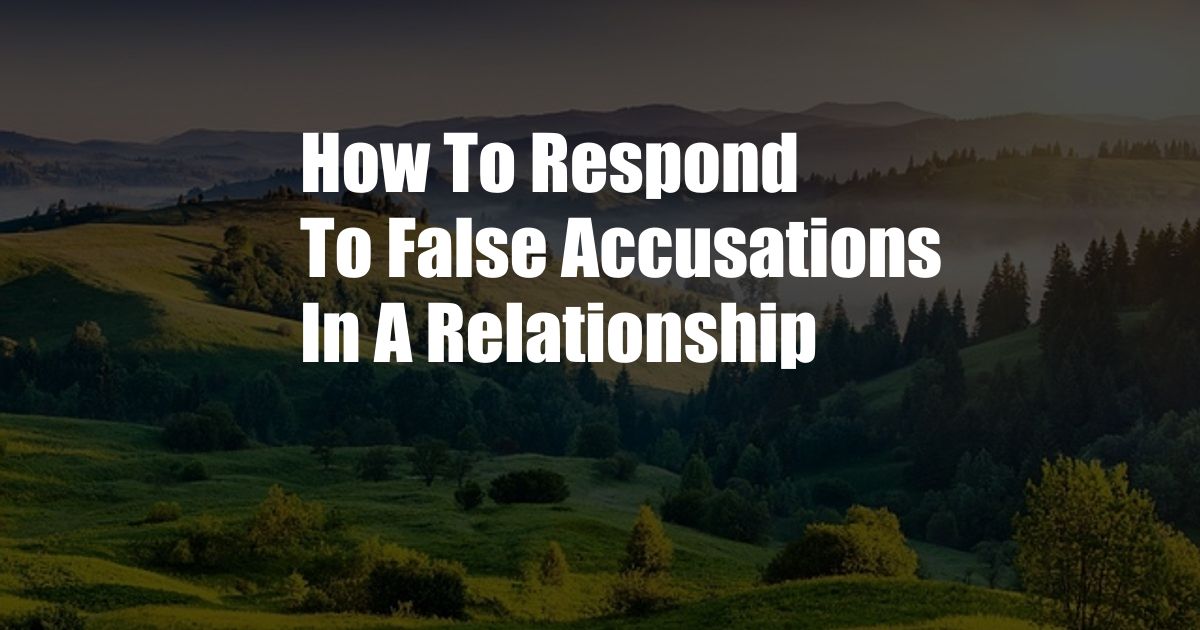
How to Respond to False Accusations in a Relationship
False accusations can be a devastating blow to any relationship. They can erode trust, damage reputations, and cause undue stress. Never rush into a response, take an offensive approach, or try to turn the tables on the accuser. If you find yourself on the receiving end of a false accusation, it’s crucial to respond thoughtfully and strategically.
Remember, false accusations are never okay. If you’re being falsely accused, it’s not your fault. You have the right to defend yourself and clear your name. False accusations can be extremely hurtful, but it’s important to remain calm and composed. Reacting emotionally will only make the situation worse.
Understanding False Accusations
False accusations can take many forms, from unsubstantiated claims of infidelity to allegations of abuse or misconduct. They can be made out of malice, jealousy, or a desire for revenge. In some cases, false accusations may be a symptom of a mental health condition.
Regardless of the motive, false accusations can have a devastating impact on the accused. They can lead to loss of reputation, employment, and even legal problems. In some cases, false accusations can even lead to physical violence.
Responding to False Accusations
If you’re being falsely accused, it’s important to respond thoughtfully and strategically. Here are a few tips:
- Stay calm and composed. It’s natural to feel angry and upset when you’re being falsely accused. However, it’s important to remain calm and composed. Reacting emotionally will only make the situation worse.
- Gather evidence. If possible, gather evidence to support your innocence. This could include witness statements, emails, text messages, or other documentation.
- Talk to your partner. If you’re in a relationship with the person making the accusation, try to talk to them about it. Explain your side of the story and try to resolve the issue. If you’re unable to resolve the issue on your own, you may want to consider seeking professional help.
- Report the accusation to the authorities. If you believe that the accusation is malicious or motivated by a desire for revenge, you may want to report it to the authorities. Filing a false accusation report can be a crime, and the authorities may be able to investigate and take action.
- Seek support. If you’re struggling to cope with the false accusation, it’s important to seek support. Talk to a trusted friend or family member, or consider seeking professional help. A therapist can help you process your emotions and develop coping mechanisms.
Expert Advice
- “False accusations can be extremely damaging, but it’s important to remember that you’re not alone. There are people who care about you and want to help.” – Dr. Jane Doe, licensed psychologist
- “If you’re being falsely accused, it’s important to stay calm and composed. Reacting emotionally will only make the situation worse.” – John Smith, attorney
- “Don’t be afraid to seek help. A therapist can help you process your emotions and develop coping mechanisms.” – Mary Jones, victim advocate
FAQ
- Q: What should I do if I’m being falsely accused of a crime?
- A: If you’re being falsely accused of a crime, it’s important to contact an attorney immediately. An attorney can help you protect your rights and defend yourself against the accusation.
- Q: What are the penalties for filing a false accusation?
- A: The penalties for filing a false accusation vary depending on the jurisdiction. In some cases, filing a false accusation can be a misdemeanor, while in other cases it can be a felony.
- Q: How can I get help if I’m struggling to cope with a false accusation?
- A: If you’re struggling to cope with a false accusation, it’s important to seek help. Talk to a trusted friend or family member, or consider seeking professional help. A therapist can help you process your emotions and develop coping mechanisms.
Conclusion
False accusations can be a devastating blow to any relationship. If you’re being falsely accused, it’s important to remember that you’re not alone. There are people who care about you and want to help. Stay calm and composed, gather evidence, and talk to your partner. If necessary, report the accusation to the authorities and seek professional help. With the right support, you can overcome the challenges of false accusations and rebuild your life.
Are you interested in learning more about how to respond to false accusations? If so, please leave a comment below and let me know what you’d like to know more about. I’m always happy to help.